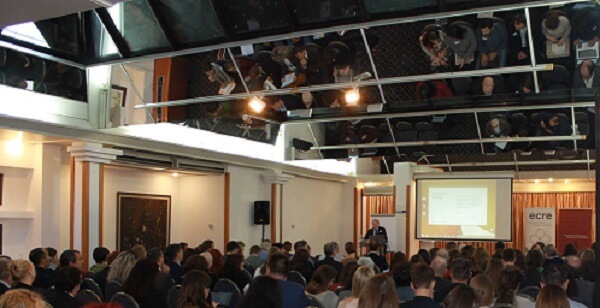ECRE’s Annual General Conference (AGC) took place last week in Belgrade and demonstrated that civil society working on refugee rights remains strong and determined despite the backlash we face. It is a sign of both this strength and of the commitment to collective work that more participants than ever before joined the AGC, held in conjunction with the UNHCR consultation for Europe.
ECRE’s membership also reached a record 101 organisations in 41 European countries, with the acceptance of three new organisations, French Refugee Council, Latvian Human Rights Centre, and Slovakian Human Rights League. Refugee-led organisations are more active and prominent, with 6 more joining ECRE this year, and individual refugee advocates contributing as experts throughout the meeting.
One of the topics of discussion was whether the sector is too pessimistic about what is happening in Europe. In an average week, we are likely to be accused of being both too pessimistic and too optimistic. But this debate misses the point. How we feel about the situation in Europe doesn’t matter; how we act is what counts.
There is much that is bleak about what surrounds us in Europe: the toxic political debate, the humanitarian crises, the harsh reality of daily living for far too many refugees and migrants, and the underlying frustration that Europe could and should have managed the arrival of people and even turned it into a win-win. That it hasn’t, means that the work of civil society is more needed than ever and we need to focus on getting on with the job. That means NGOs operating in a thoughtful and responsible way, including learning from our colleagues elsewhere in the world, many of whom have faced challenging situations for years. There is also inspiration to be drawn from historical struggles for human rights, many of which were far more difficult.
Effective action also means accepting and adapting to new circumstances. During the AGC, we heard very useful advice from NGOs in Hungary and Serbia on how to operate in difficult circumstances. We will expand the conversation to learn from our counterparts in other regions because if undemocratic governments learn from each other about how to repress civil society, we can learn from each other on how to resist.
NGOs in Europe are also recognising and managing the challenges to their own personnel of developments. People across the sector experience burn-out, depression and secondary trauma – of course particularly those directly providing humanitarian and legal assistance, and those particularly close to communities. It is the responsibility of organisations and individuals to ensure that people have the support they need and here the experience of the humanitarian sector outside Europe is useful.
Finally, the huge wave of public support for refugee rights in Europe – in all countries – is a significant positive development but it has to be channeled into responsible action. The Do No Harm principle is paramount. Donors, partners and allies can assist in assessing the impact of possible activities, and on deciding collectively who is best placed to do what. Reflection and division of labour leads to more effective overall action. This becomes crucial as even more difficult dilemmas arise, such as what we should do when basic humanitarian responses – indeed basic human responses – are restricted or criminalised. When is it acceptable to disregard unjust laws? What are the implications of doing so?
Civil society working on asylum and migration is effective and that is why we face a backlash. We cannot deny the situation but neither can we be dragged down by how we feel about it. Because we have work to do.
Editorial: Catherine Woollard, Secretary General for the European Council on Refugees and Exiles (ECRE)
This article appeared in the ECRE Weekly Bulletin . You can subscribe to the Weekly Bulletin here.

